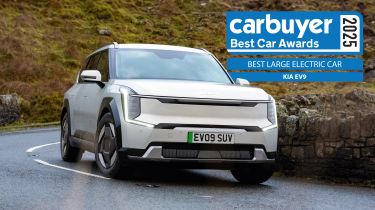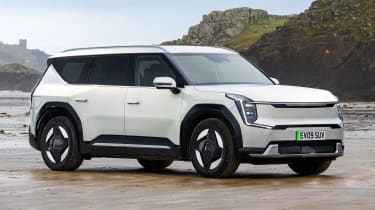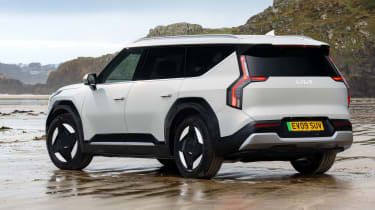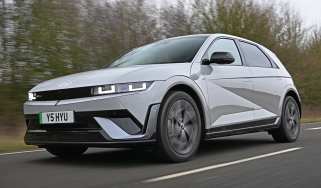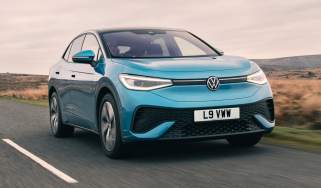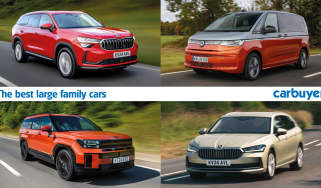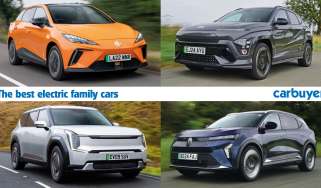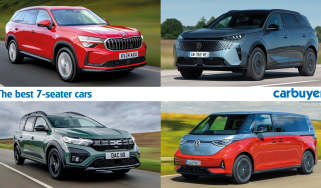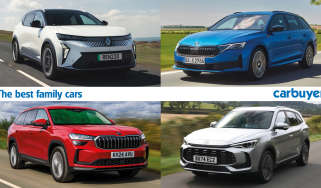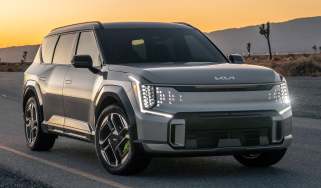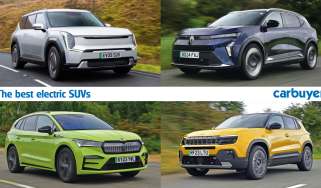Kia EV9 review – a great seven-seater electric SUV
“Kia has taken on premium manufacturers and produced a flagship seven-seat electric SUV that’s also a superb family car”
Pros
- Seven-seat practicality
- Excellent EV powertrains
- Clever interior
Cons
- Kia’s most expensive car ever
- Not the most efficient EV
- Frustrating haptic controls
Verdict – is the Kia EV9 a good car?
The Kia EV9 successfully moves the brand into direct competition with some of the world’s most respected manufacturers, such as Audi, BMW, Mercedes and Volvo. It’s a truly impressive large electric SUV, with up to seven seats, a range of over 300 miles and very fast charging – traits that bagged it our Best Large Electric Car award for 2025. It's expensive to insure, though, a few other cars offer a more premium feel at this price point, and it's not the most efficient EV in real-world conditions. However, it should prove to be a great family car and, for now, it’s the seven-seat EV to beat, even if you stick to entry-level Air trim.
Kia EV9 models, specs and alternatives
Kia has completely turned around its image in the past few decades, going from a forgettable budget brand to a major player. The Kia EV9 is its largest electric SUV and a real milestone for the brand, as it’s the most expensive Kia ever, costing from £65,000 in entry-level Air trim – that’s not too far off the price you’d pay for a Land Rover Discovery fitted with a mild-hybrid diesel engine.
The Kia EV9 is big, with dimensions not far off those of the electric Range Rover coming later in 2024. Other large electric SUV rivals are also set to include the Volvo EX90 (which starts from over £90k) and models such as the Tesla Model X, Audi Q8 e-tron and Mercedes EQC.
After preliminary drives in South Korea and France, we’ve now driven the Kia EV9 extensively in the UK, so we have an excellent feel for it in multiple driving environments and road conditions. Every experience has left us impressed with Kia’s largest car, and not even the UK’s pothole-filled roads could hamper the ride – the EV9 has proven itself as a practical, comfort-focussed model, which will please UK buyers with a large family.
What struck us most about the Kia EV9 was just how quiet it was on the move – while electric vehicles are almost always quieter than their combustion-engined counterparts, the EV9 was particularly so, with not even the faintest hint of whine from the motors or noise from the tyres. It certainly is a departure from the clattering of a big diesel engine – a mainstay of large SUVs of old.
The Kia EV9 has already made quite an impression with our sister title DrivingElectric, which awarded it overall Car of the Year for 2024, as well as Best Premium Electric Car. That was thanks to its “huge space and practicality, premium feel and competitive range”, said the judges. Following on from this success, our experts named it Best Large Electric Car in our Carbuyer Best Car Awards for 2025.
The Kia EV9 is available from launch in three trim levels: ‘Air’, ‘GT-Line’ and ‘GT-Line S’. Entry-level Air models are only available with the single-motor rear-wheel drive powertrain. GT-Line S models can be had in the standard seven-seater, or an optional six-seater configuration. We’ve tested the latter, which swaps out the middle row for two larger, more comfortable captain’s chairs, but commands a £1,000 premium. If your priority is to enable rear seat passengers to travel in utmost comfort, then you might think it worth the extra outlay. If you’d rather the added practicality of the extra seat, the mid-row bench will be spacious enough – Kia expects this seven-seat model to make up the majority of sales in the UK.
Equipment is generous, with all models getting three screens: a 12.3-inch digital dash display, 5.3-inch climate control touchscreen and a 12.3-inch infotainment screen with Android Auto and Apple CarPlay. Wireless phone charging, plus niceties such as heated and ventilated front seats and a heated steering wheel are also standard.
Ambient lighting helps create a premium atmosphere, while the exterior is set off by alloy wheels from 19 inches in diameter. Amongst other things, GT-line will bring bigger wheels, replace the traditional door mirrors with cameras and upgrade the headlights to LED units. GT-line versions will also get a different bodykit and darkened exterior trim.
The EV9 is based on a stretched version of the E-GMP platform found in models such as the Kia EV6, Hyundai Ioniq 5 and Hyundai Ioniq 6. While a 76Wh battery will be offered in some markets, UK models get the larger 100kWh battery as standard. This can be had with a single 200bhp motor in a Long Range version, which can top 349 miles if travelling long distances is your priority over speed. Alternatively, there’s the AWD (all-wheel drive) version we’ve also had a chance to test out, with 378bhp from its two electric motors. Even more torque can be ‘downloaded’ via an over-the-air update called Boost, cutting its 0-62mph time to just 5.3 seconds.
| Trim levels | Power options |
|
|
Kia EV9 alternatives
There aren’t a huge number of seven-seat EVs on the market yet, and the majority of those hail from luxury manufacturers. While the EV9 may seem very expensive, it undercuts most of these premium electric SUVs, giving the Kia a fairly unique market position until more manufacturers get in on the act.
Electric SUVs
Should you buy a Kia EV9?
The Kia EV9 may be the most expensive car the brand has ever made thus far, but it’s testament to how far the company has come in the last few decades. It was one of the first seven-seater EVs on the market when it launched, and it’s the one to beat, winning our Best Large Electric Car award in the 2025 Carbuyer awards.
Kia’s electric powertrain is incredibly smooth and refined, making for a very serene experience from inside the EV9. We’re big fans of the EV9’s interior, too, and the stellar fit and finish makes for a slightly upmarket experience. If you only need six seats, you can upgrade the middle row by swapping the bench out for two captain’s chairs, which make for an even more comfortable and roomy feel.
The EV9 will go a respectable distance on a charge, but it’s not necessarily the most efficient EV. Some of the haptic controls can be frustrating to use, too, but really these are minor gripes for what is a seriously impressive EV.
What is the Carbuyer pick of the Kia EV9 range?
The Kia EV9 may be rather expensive, but at least the entry-level model is well equipped – for that reason we’d stick with Air trim, which gets 19-inch alloys, the 12.3-inch infotainment and driver’s displays and useful kit like a wireless smartphone charging pad, heated and ventilated front seats and more. We think most buyers will find the more affordable single-motor version powerful enough.
Which Is Best?
Cheapest
- Name149kW Air 99.8kWh 5dr Auto
- Gearbox typeAuto
- RRP£66,565
Most Economical
- Name282kW GT-Line 99.8kWh AWD 5dr Auto
- Gearbox typeAuto
- RRP£74,565
Fastest
- Name374kW GT 99.8kWh AWD 5dr [7St] Auto
- Gearbox typeAuto
- RRP£82,765
